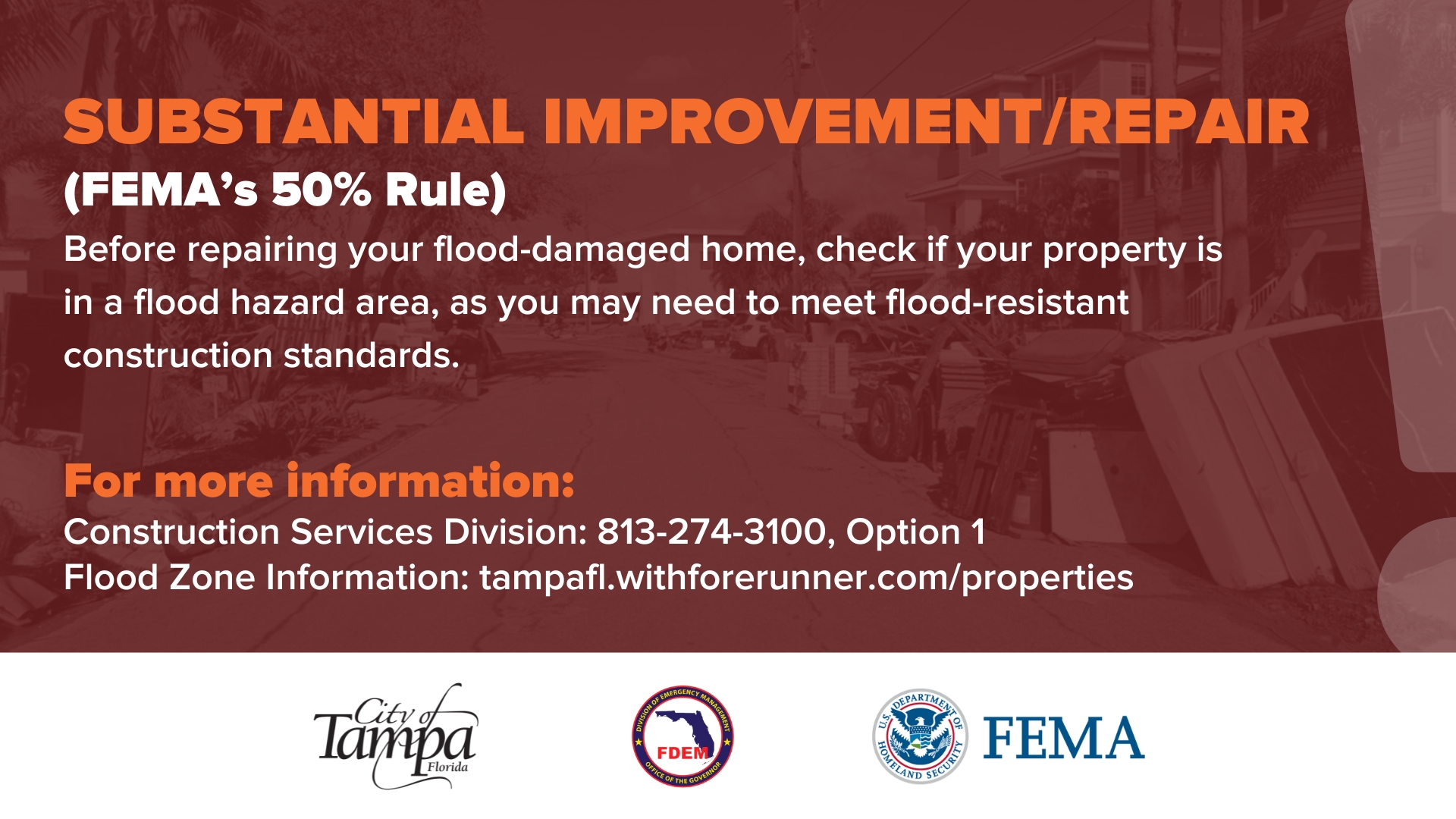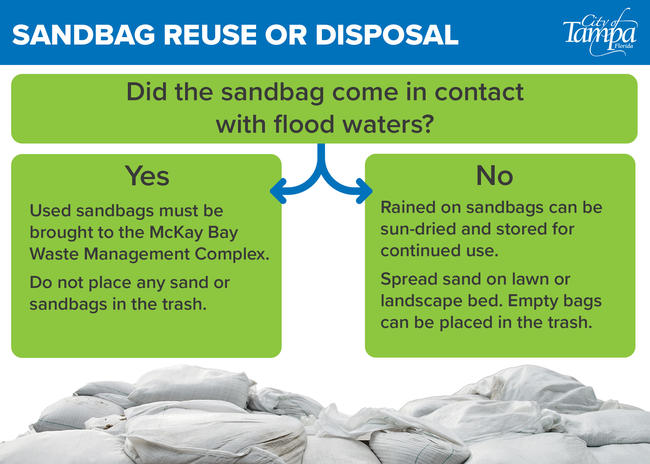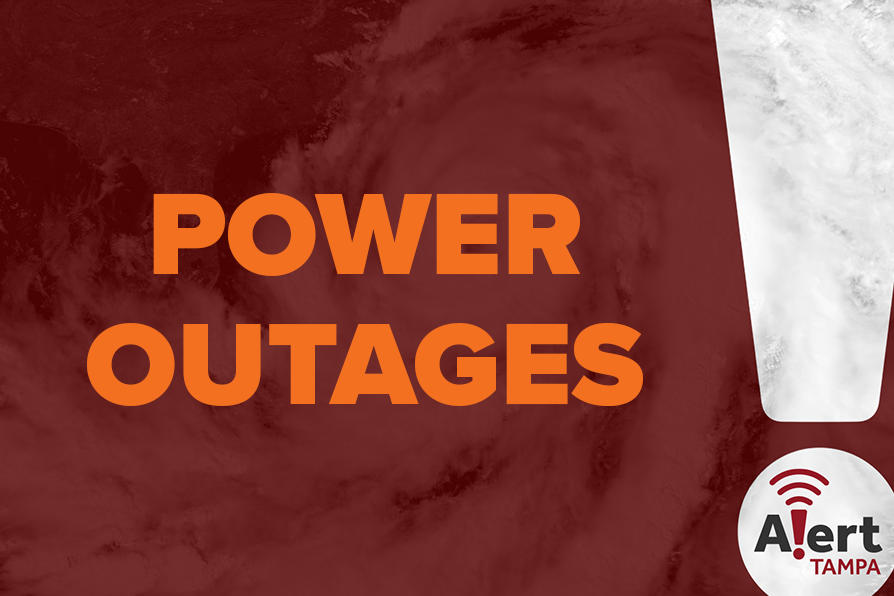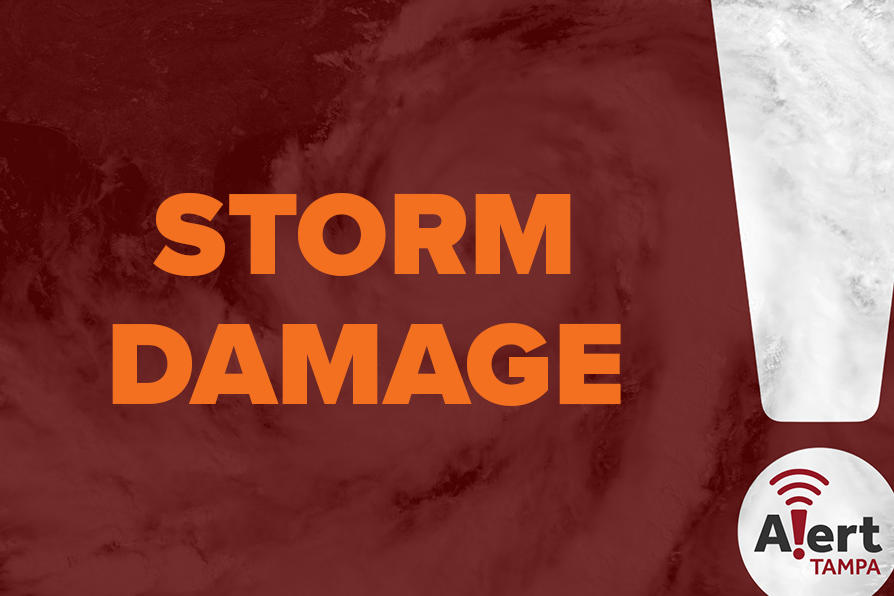Disaster Contractors Network facilitates connections between Florida property owners and building professionals, ensuring effortless access to storm-related goods and services. Recognizing the urgency of the situation, DCN acts as the ultimate intermediary between homeowners, contractors, suppliers, associations, and vital information. Please find a comprehensive directory of skilled contractors specializing in various services such as air conditioning, plumbing, roofing, and flooring.
City of Tampa Hurricanes Helene and Milton Permit and Construction Memorandum: Mayor’s Emergency Management Powers
Waiver of Certain Permit Application and Inspection Fees & Certain Provision in Floodplain Management Ordinance
FEMA's 50% Rule¶

Before you perform repairs to your flood-damaged home, please note that if your property is located in a flood hazard area (Flood Zone AE, Coastal A, and VE)*, you may be required (by FEMA and State of Florida requirements incorporated and applied by the City of Tampa) to rebuild to Florida Building Code flood-resistant construction standards. This determination/requirement is based on whether the required improvements/repairs are deemed a “substantial improvement” or “repairs of substantial damage,” which generally means that the improvements/repairs exceed 50% of the structure’s depreciated value pre-flood damage as listed on the Hillsborough County Property Appraiser’s listing for your property.
View Hillsborough County 50% Improvement Calculator
For answers to questions about whether your improvements/repairs are “substantial”, please contact the City’s Construction Services Division at: 813-274-3100, Option 1.
To learn more about your property’s location and relevant flood information please visit https://tampafl.withforerunner.com/properties
PLEASE NOTE: You should also contact your insurance carrier(s) and mortgage lender before making improvements/repairs, as they may have other applicable requirements.
Beware of Contractor Scams¶
After a disaster, qualified contractors are usually in high demand. Scammers or unqualified out-of-state workers may take advantage of Floridians in need of expert service.
If you have been approached to have work done on or at your home, you can check if that individual is licensed through the Department of Business and Professional Regulation (DBPR) or by going to myfloridalicense.com.
If property is damaged from the storm, the Florida Attorney General’s Office offers these tips when hiring a contractor:
- Insurance evaluation - Ensure repair work will be covered under your insurance policy. Have an insurance company evaluate damage before arranging repairs.
- Estimates – Obtain at least three written, itemized estimates on bids or repairs
- Bogus offers - Watch out for unsolicited offers or contractors claiming to perform repairs at a discount with leftover supplies from another job
- Do your research – To check on a company’s reputation, look for references online or ask a friend. Also check to see if a company is properly licensed, insured, and if there are any consumer complaints filed against a licensed contractor at Florida Department of Business & Professional Regulation or by calling the Florida Attorney General’s Office at (866) 9NO-SCAM.
- Bonded - Make sure a contractor is bonded and verified with a bonding agency
Read the fine print – Although it may be daunting, read the entire contract before signing to ensure it includes the required buyer’s right to cancel language. Understand penalties that may be imposed for cancellation. - Liens - Insist on releases of any liens that could be placed on the property from all subcontractors prior to making final payments. Homeowners may unknowingly have liens placed against their properties by suppliers or subcontractors who have not been paid by the contractor. If the contractor fails to pay them, the liens will remain on the title.
- Deposits and final payment - Never pay the full amount of a repair expense upfront and be wary before providing large deposits. Do not sign a certificate of completion or make final payment until satisfied with the work performed.
Safety Tips for After a Flood¶
- Return home only when officials have declared the area safe. Use caution before entering your home: look outside for loose power lines, damaged gas lines, foundation cracks and other damage.
- If power lines are down outside your home, do not step in puddles or standing water. Report them to the power company.
- If you smell natural or propane gas or hear a hissing noise, leave immediately and call the fire department.
- Cleaning products, paint, batteries and fuel containers have the potential to be hazardous. Please check with local authorities for assistance with disposal.
- Keep an eye out for animals such as snakes, possums and raccoons that may have moved into your evacuated home, as they often look for relief from floodwaters.
- If you drive an electric vehicle and there are floodwaters around your home, do not drive through it. If water gets into the battery, it could potentially cause a fire.
Dealing with Damage in your home
- As soon as it's safe to return home, contact your insurance agent or company to file a claim. Photograph and list all damaged items including their age and value.
- Insurance adjusters will need evidence of damage to prepare an estimate, so take photos of water in your house, including structural, personal property and floodwater levels. You can also record serial numbers of large appliances and collect receipts for damaged items.
Prepare a Proof of Loss
- Your insurance adjuster will help you prepare a Proof of Loss, which is a sworn statement of the amount you're claiming. You'll need to file this with your insurance company within 60 days of the flood.
- You can take measures to mitigate further damage, such as tarping, but don't repair damage before your adjuster visits.
Sandbag Reuse Guidance¶
If sandbags did NOT come in contact with floodwaters, sandbags can be reused for future preparedness. Rained on sandbags can sun-dried and stored in a dry location until time to reuse. Clean sand can also be spread in gardens or on lawns, and empty bags can be stored or disposed of.
If sandbags have come in contact with floodwaters, sandbags should not be reused due to potential contamination. To dispose of sandbags, residents should bring them to the City of Tampa McKay Bay Scale House (114 S 34th Street). Residents should NOT place sand bags in any City-issued solid waste container.

Executive Orders:¶
- E.O. 2024 - 1 - Invest 971
- E.O. 2024 - 2 - Tropical Cyclone 9
- E.O. 2024 - 5 - Tropical Storm Milton
- E.O. 2024 - 6 - Extending the State of Emergency for Hurricane Helene
- E.O. 2024 - 8 - Extending the State of Emergency for Hurricane Helene
- E.O. 2024 - 9 - Extending the State of Emergency (Hurricane Milton)
- E.O. 2024 - 10 - Hurricane Helene (Extending 2024-2)
- E.O. 2024 - 11 - Hurricane Milton Extending
- E.O. 2024 - 12 - Hurricane Helene (Extending 2024-2)
- E.O. 2024 - 14 - Extending Helene State of Emergency
- E.O. 2024 - 15 - Extending Hurricane Milton State of Emergency
- E.O. 2024 - 16 - Extending Helene State of Emergency
- E.O. 2024 - 17 - Extending Hurricane Milton State of Emergency
- E.O. 2024 - 18 - Hurricane Helene (Extending 2024-2)
- E.O. 2024 - 20 - Hurricane Helene (Extending 2024-2)
- E.O. 2024 - 21 - Extending the State of Emergency (Hurricane Milton)
- E.O. 2024 - 22 - Hurricane Helene (Extending 2024-2)
- E.O. 2024 - 23 - Hurricane Helene (Extending 2024-2)
- E.O. 2024 - 24 - Hurricane Helene (Extending 2024-2)
- E.O. 2024 - 25 - Hurricane Milton Extending State of Emergency
- E.O. 2024 - 26 - Extending Helene State of Emergency
- E.O. 2024 - 27 - Extension for Hurricane Milton
- E.O. 2024 - 28 - Hurricane Helene (Extending 2024-2)
- E.O. 2024 - 29 - Extending the State of Emergency (Hurricane Milton)
- E.O. 2024 - 30 - Hurricane Helene (Extending 2024-2)
- E.O. 2025 - 1 - Extension for Hurricane Milton
- E.O. 2025 - 2 - Hurricane Helene (Extending 2024-2)
- E.O. 2025 - 3 - Extension for Hurricane Milton
- E.O. 2025 - 4 - Hurricane Helene (Extending 2024-2)
- E.O. 2025 - 5 - Hurricane Milton Extending State of Emergency
- E.O. 2025 - 6 - Hurricane Helene (Extending 2024-2)
- E.O. 2025 - 7 - Extension for Hurricane Milton
- E.O. 2025 - 8 - Hurricane Helene (Extending 2024-2)
What Are The Hurricane Hazards?¶
STORM SURGE - A hurricane can produce destructive storm surge, which is water that is pushed toward the shore by the force of the winds. This advancing surge combines with the normal tides to inundate normally dry land in feet of water. The stronger the storm, the higher the storm surge.
INLAND FLOODING - In the last 30 years, inland flooding has been responsible for more than half the deaths associated with tropical cyclones in the United States.
HIGH WINDS - Hurricane-force winds can destroy poorly constructed buildings and mobile homes. Debris such as signs, roofing material, and small items left outside become flying missiles in hurricanes.
TORNADOES - Hurricanes can produce tornadoes that add to the storm's destructive power. Tornadoes are most likely to occur in the right-front quadrant of the hurricane.
How Do I Prepare?¶
Emergency Contact Information¶
Report fallen trees, traffic light outages, street flooding, and storm debris in the right-of-way:
- Call (813) 274-3101
- Open 8am-5pm
Report electric power outage, downed power lines, or other safety concerns to TECO:
- (877) 588-1010
- Via the TECO Outage Map
- Text OUT to 27079
Report price gouging in the State of Florida:
- (866) 966-7226
Wastewater Emergency Repair / Sewer Backup
- (813) 247-3451
Water Department Emergency Services (24 hours)
- (813) 274-7400
Tree Hotline/Emergency
- Illegal Tree Removal (24 hours): (813) 258-8733
- Fallen Tree on city streets/sidewalks (business hours 8:00 AM to 5:00 PM): (813) 274-5744
- Fallen Tree on city streets/sidewalks (after hours 5:00 PM to Midnight): (813) 931-2168
- Fallen Tree on city streets/sidewalks (after hours Midnight to 8:000 AM): (813) 274-3101
Things to Know¶
Generator Safety Information
- Keep portable generators outside, away from windows, and as far away as possible from your home. Carbon Monoxide poisoning can occur when a generator is not working or vented properly.
- Never use a generator in an attached garage, even with the door open
- Don't use generators in a wet area. This can cause shock or electrocution.
- Connect appliances to generators with grounded, heavy-duty extension cords.
- Turn off your generator and let it cool before refueling. Never refuel a running generator.
- See more generator safety tips
Food Safety During a Power Outage
Planning for a Possible Power Outage
- If your freezer isn’t full, help keep your items cold longer by grouping items together, freezing containers of water, gel packs, and refrigerated items you don’t need immediately
- Place appliance thermometers in your refrigerator and freezer
During a Power Outage
- Keep refrigerator and freezer doors closed to maintain cold temperature
- A full freezer can keep its temperature for up to 48 hours, 24 hours if half full
- A fridge will keep food safe for up to 4 hours
Once Power is Restored
- Throw out any perishable foods that have been exposed to temperatures above 40°F for more than two hours, or has an unusual odor, color, or texture.
Staying safe on the roadways after a storm
- Check your vehicle for any damage prior to driving it
- Do not drive through flooded streets
- Six inches of water will reach the bottom of most passenger cars causing loss of control and possible stalling
- Avoid downed power lines
- Assume all wires are live
- If a traffic light is out, treat it as a four-way stop
- Watch for fallen trees and debris in the roadway
- Report obstructions in the roadway at (813) 274-3101 from 8am-5pm
Prepare Your Home for a Possible Power Outage
- Have flashlights and extra batteries on hand
- Avoid using candles to prevent accidental fires
- Charge mobile devices and portable battery packs
- Fill up your vehicle’s gas tank
- Use a surge protector or disconnect appliances and other equipment in case of a momentary power “surge” that can damage computers and other devices.

Report Power Outages
Report electric power outage, downed power line, or other safety concerns to TECO:
- (877) 588-1010
- Via the TECO Outage Map
-
Text OUT to 27079
NEVER run a generator inside a home or garage. If using a generator, place it outside away from any windows. Review these Generator Safety Tips.

Report Storm Damage
Report fallen trees, traffic light outages, street flooding, and storm debris in the right-of-way:
- Call (813) 274-3101
- Open 8am-5pm
NEVER drive through flooded water. Just 6" of water will reach the bottom of most passenger cars causing loss of control and possible stalling. See reported street flooding in real time.

